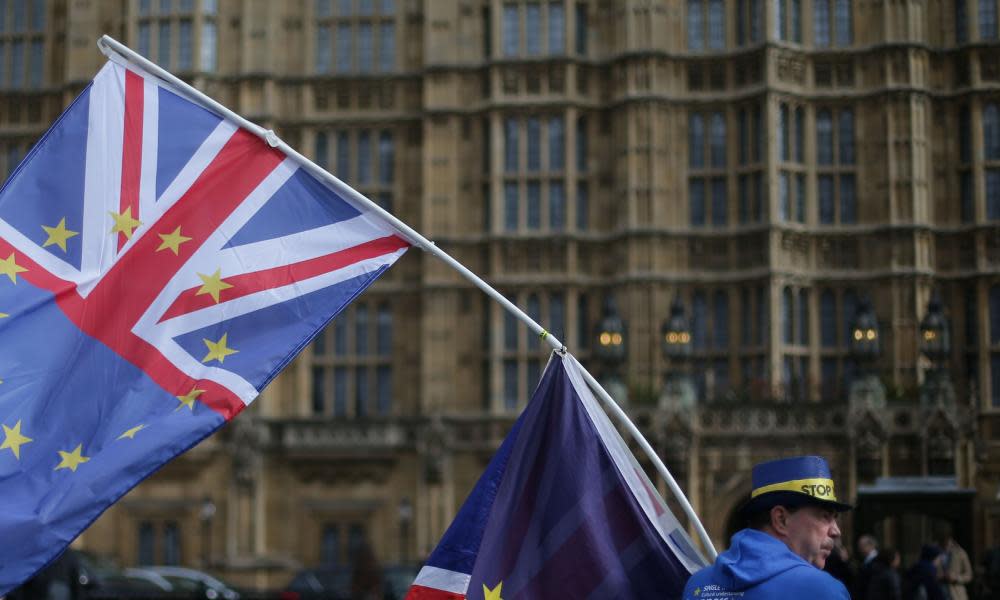Tory MPs among backers of motion demanding vote on EU customs union

Theresa May next week faces a show of defiance from MPs fighting to keep the UK in a customs union with the EU after 10 select committee chairs tabled a motion aimed at forcing a vote on the issue
Three Conservatives – Bob Neill, Nicky Morgan and Sarah Wollaston – are among the signatories to the motion, which urges the government to “include as an objective in negotiations ... the establishment of an effective customs union”.
The government lost a vote in the House of Lords on Wednesday night by a hefty majority of 123 on a cross-party amendment that would force ministers to report to parliament on their moves to keep the UK in a customs union.
MPs campaigning against a hard Brexit, including Anna Soubry and Chuka Umunna, have tabled amendments to the trade bill and customs bill demanding that the option of a customs union be kept on the table.
But the government has delayed bringing the legislation back to the Commons, avoiding the risk of an embarrassing defeat, so the select committee chairs are using their power to raise issues in the Commons to force a vote.
Other signatories include Labour’s Hilary Benn and Yvette Cooper, the Liberal Democrats’ Norman Lamb, and the Scottish National party’s Angus MacNeil.
Supporters of a customs union hope the debate will underline the lack of support in parliament for taking the UK out of the customs union.
Soubry said: “You will get the mood of the House: that’s important. If Theresa May wanted to, she could change her mind on this.”
But Jacob Rees Mogg, chair of the pro-Brexit European Research Group of backbenchers, warned against the liaison committee - made up of the select committee chairs - politicising its role.
“It is unusual for the liaison committee to propose a motion and makes it more a political pressure group rather than the guardians of the rights of the House of Commons. In behaving this way, it regrettably devalues itself,” he said.
The motion from the committee chairs came as the government dismissed claims that its proposals for avoiding border checks between Northern Ireland and the Republic had been subjected to a “forensic annihilation” by EU negotiators.
After talks on Wednesday between the two sides, the Telegraph quoted senior EU diplomatic sources saying the government’s proposals for resolving the issue had been rejected. “It was a detailed and forensic rebuttal. It was made clear that none of the UK’s customs options will work. None of them.”
While government sources rejected the idea that May’s proposals had been comprehensively dismantled by negotiatiors, they are concerned about what they regard as the inflexible approach adopted by the EU negotiator, Michel Barnier, and his team.
A government spokesman said: “We have been clear that we will protect Northern Ireland’s place in the UK internal market. That commitment was set out in December’s joint report which also includes our guarantee of avoiding a hard border between Northern Ireland and Ireland. We are continuing an intensive work programme to engage on all the scenarios set out in the joint report.”
Those wanting to remain in a customs union – which would avoid border checks, but constrain the UK from striking its own trade deals – are concerned about the impact on the economy if the UK left.
The motion “notes the government’s expressed aim to provide the freest and most frictionless possible trade” with the EU and “further notes the importance of frictionless trade without tariffs, customs or border checks for manufacturers and businesses”.
Morgan, who chairs the Treasury select committee, and Cooper, who chairs the home affairs select committee, said: “With just six months to go before the Brexit deal needs to be concluded, we are running out of time for parliament to help to shape the negotiations.
“Yet many of our backbench committees have forensically gathered evidence on different Brexit options and the practical implications. That is why committee chairs at the liaison committee – including those who voted leave and who voted remain, supporters and opponents of a customs union – concluded that backbench MPs should get the chance of an early constructive debate and vote on this crucial issue, not bound by the party whips, but informed by committee evidence instead.
“If parliament stays silent until after the deal is done, that is just a recipe for conflict and regret later on. Far better for us to debate this properly now and let parliamentarians express their view before it is too late.”
The vote will be non binding but, after the defeat in the Lords on Wednesday, its proponents hope it will demonstrate there is no majority in the Commons for leaving the customs union, something May has insisted on since her Lancaster House speech last January.
The shadow Brexit secretary, Keir Starmer, said: “This is further evidence of the growing chorus of cross-party voices concerned that Theresa May’s position on a customs union is wrong in principle.”

 Yahoo News
Yahoo News 
